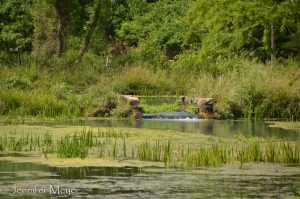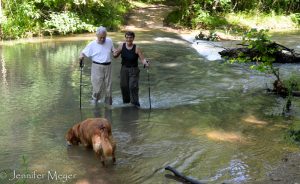It’s been 40 years since I was with my dad on Father’s Day. When I realized our visit with him in Springfield, Missouri would be over the holiday, I wanted to do something special. Kate and I suggested taking him camping nearby. When he reminded me that his aunt and uncle’s old farm is now part of the Mark Twain national forest, I suggested going on a quest to find it. His eyes lit up. That property was a big part of his life growing up, and I had great memories of the farm as well. It wasn’t a farm so much as a retirement estate.
My great uncle, Morris Dewitt, had a construction company in St. Louis. He built the first cloverleaf highway interchange west of the Mississippi in 1931, and constructed much of the Missouri stretch of Highway 66. When he was nearing retirement, he bought 3,000 acres of forest and meadow near Joplin. He and his wife, Marie, built a rustic split rail cabin on the property, damned a spring to create a lake and stocked it full of bass, and maintained about 50 head of cattle.
Uncle Morris and Aunt Rie didn’t have any children, but they welcomed all their nieces and nephews to the place they named “Dewitt’s Folly.” My dad and his brothers spent weeks at a time there when they were kids. When Mom and Dad got married, Morris and Rie handed over the keys to their new Pontiac and their house as a honeymoon getaway. My siblings and cousins all grew up visiting this idyllic property and kindly aunt and uncle.
After Morris, then Rie died, the land was sold to the Missouri Conservatory and became part of the Mark Twain National Forest. When maintaining the beautiful old log cabin became problematic, it was destroyed. Dad had gone out, years ago, with my cousin and found the old homestead on the banks of the lake. There was nothing left but some chunks of foundation, and a picnic table and fire ring had been added. Dad was very excited about getting one last look at this land. We left Saturday morning in Bessie, towing the CRV. We thought we would set Bessie up in a nearby campground, then take the CRV to go find the property. But two days earlier, all of Missouri had been hit by the tail end of a tropical storm, and every campground we stopped at was flooded. So we just took Bessie right out to the national forest.
We found a gravel parking lot where we unhooked and drove further in the CRV. We found the Methodist church, built in 1887, which had been on the land of Dewitt’s Folly. Soon after was a dirt road to the left that Dad recognized as the road to the house, but a puddle the size of a small pond filled a portion of the road. I waded through it to my knees before I shook my head and gave it up. We went back to Bessie and determined that the empty gravel lot we were in, far down a remote road, would be a perfect place to “boondock” for the night. We would stay and “camp,” and go back to the flooded road in the morning when it was cooler to see if we could forge a way through it.
It was miserably hot and muggy out, into the mid-90s. So after sitting outside a while, we retreated inside, ran the generator to have air conditioning, and watched an old Orson Wells movie. Come dinner time, I pulled out the grill and cooked some hamburgers, and we spent a little more time outside. Dad was already asleep in the dinette bed when I noticed bright flashes outside. I peered out our window and saw the most magical thing: thousands of lightning bugs flickering against the dark of the treed hills in the distance. We’ve watched lightning bugs every night since we’ve been here, and I love them. They’re both festive and peaceful, drifting over lawns at dusk. But in all my years growing up in the Midwest, I’d never seen a sight like this. Literally thousands, in all directions… tiny little explosions. A battlefield of joy, with a chorus of crickets and frogs. Above, a clear sky full of more stars than I’d seen since Zion. And beyond the hills in the distance, the glow of lightning from a far storm. If I hadn’t been afraid of stepping on dogs and waking Dad, I would have sat outside half the night watching this spectacular show.
We got going early the next morning. We put on long pants and closed shoes for hiking through grass. We unpacked our three walking sticks. And after a quick cup of caffeine, we went back to the farm road. It was just as flooded. But we beat a path through the stickers and thick brush on the edge of the road and made our way to the other side. From there we had a clear walk on the road for a half a mile until we reached the place where a creek, now river, washed over the road. I remembered this spot so well. The creek always flowed a couple of inches over the road, and as kids it terrified us to drive through it. But Dad would pull over and let us splash around in the gentle flow, showing us it was more fun than fearsome. The creek bordered on fearsome today, after the big storm. Dad and I slumped in disappointment and started to call it a day. But Kate tromped into the water with Bailey and Dad’s golden, Annie. The river was a good 50 feet wide, but when she’d made it halfway, water coursing at her knees, she said, “I think we can do it.”
Dad has always been foolhardy. “Oh, hell. Why not?” was a standard phrase of his. And he said it again. Rolled up his trousers (a wasted effort), steadied himself was his walking stick in one hand, gripping my arm with the other, and inched forward over the rocky streambed. Midway I had to push down panic. The current was strong and high, flowing over a short waterfall to our side. Here I was with my 86-year-old dad who’s about to have heart surgery, has “bad legs” and normally doesn’t walk further than the mailbox. We were out of cell phone reach, on a road that was blocked to vehicles, with absolutely no one within miles. Even a twisted ankle could mean disaster. But when I looked at my dad’s face, his eyes sparkled with excitement and determination. He hadn’t had this much fun in years.
Safe on the other side, we were all feeling exultant and invincible. The dogs pranced and shook themselves, so happy to be running free in a wild place. We walked down the road another half a mile and came to a large green gate and signs. The paths beyond here were open to hiking, biking, and horses. We were getting close. We hiked on trails and soon spotted the spring-fed lake that the cabin had overlooked. When we came to clearing with a picnic table and fire ring, we sat to rest and view the lake. This was surely the spot where the house had been, but the only remnant of it were some tiger lilies that Aunt Rie must have planted. Dad was tired, but charged up. We walked some more, through woods and along the lakeshore, climbing up and down through another streambed. We eventually came back to the picnic table, and while we rested, he reminisced about the place, spending summer weeks here with his brothers, fishing in the lake, swimming in the spring-fed pond, riding horses. When he and my mom came here for their honeymoon, the freezer was stocked with steaks, the liquor cabinet with booze. They went for a hike right off, and mom came back crawling with ticks, and he had to pick them all off of her while she squealed and squirmed.
I remembered Aunt Rie’s beloved Irish Setter, Sheila, which inspired me to get my own Irish Setter as soon as I was grown. We looked out over the lake, now so overgrown, and recalled that idyllic green heaven of a place where we fished and paddled around in boats. I remembered the distinctive smell of cedarwood burning in the huge stone fireplace. The bright red stove and refrigerator in the kitchen. After dinner, we kids would lie on the living room floor in front of speakers, and Uncle Morris would show off his high-tech stereo, playing a tape of a steam engine that when we closed our eyes we were sure was rolling right over us. Uncle Morris also had one of the first hand-held color movie cameras, so there is footage of us there as children, even of my father as a child. For my father’s 80th birthday, my cousins digitized 20 minutes of film clips. I took three minutes of that footage and turned it into my own montage, which you can view below.
Eventually, we pulled ourselves out of our reverie and started the return trek. We made it, without incident, back to Bessie, but we were all, like my mother on their honeymoon, crawling with ticks. We sat outside picking them off ourselves and the dogs, then I used the last of our tank water to wash the dogs in the outdoor shower while Kate whipped up a delicious Father’s Day breakfast, serenaded by Dad’s Father’s Day present: a West Side Story CD. After breakfast, I showed Dad the movie I’d edited showing our family at Dewitt’s Folly in the 50s and 60s. We watched my brother and me splashing in the same stream crossing we’d forged that morning, along with our cousins and uncle. Clips of my father fishing, of us kids rowing on the lake, my younger brother toddling in the grass. Can one great Father’s Day make up for 40 missed? Thirty years of estrangement makes this day even more poignant. For decades, I ignored Father’s Days. And when Dad came back into my life ten years ago, there wasn’t a greeting card in the world that captured this complicated father-daughter relationship. It’s been ten years getting to this place here, and I am so grateful for it. They are ten years I didn’t think I would have, and with a new heart valve, maybe we will have ten more.










Your description, even with ticks and heat, makes me wish I’d been able to experience that day with you. My memories of the farm are dreamlike and your description of Father’s Day was dreamlike as well. Beautifully shared.
Thank you for sharing this. I am, as so rarely happens, speechless. Not sure if it is the onslaught of another post 60 birthday, leaving Leah in Philly, so far away, or your ability to communicate so profoundly in both works and images the poignancy of family, love and the passing of time.
Thank you so much, Jan. That is a high compliment!